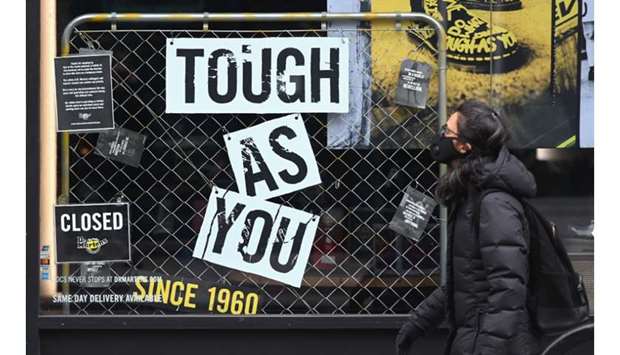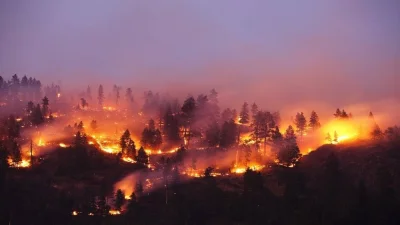The US coronavirus death toll surged past 1,000 yesterday and the number of Americans seeking jobless benefits smashed records, sombre evidence of the pandemic’s human and economic devastation.
About half the United States was under stay-at-home orders to try to curb the spread of the virus, with its side effects of strangling the economy and unleashing a wave of layoffs.
The number of Americans filing claims for unemployment benefits last week soared to a record of nearly 3.28mn, the Labour Department reported, nearly five times the previous weekly record of 695,000 during the 1982 recession.
The report may understate the problem as the official statistics typically have not included the self-employed or independent contractors.
Federal Reserve Chair Jerome Powell said the United States already “may well be in recession”.
The statistics showed that services industries, especially bars and restaurants as well as hotels, were hammered.
For the first time in his life, Travis Cumbo, 37, a bartender in St Augustine, Florida, filed for unemployment.
His bar, The Ice Plant, a few blocks from the beach, was closed because of the coronavirus, which causes the Covid-19 disease.
“My skill set is this: I can make a Dirty Rotten Scoundrel, a whiskey drink, or an Old Fashioned or a mean Moscow Mule,” Cumbo said. “I don’t really know how to do anything else.”
A running tally kept by Johns Hopkins University showed that at least 1,046 people had died from Covid-19, the respiratory disease caused by the virus.
Covid-19 has been especially dangerous to the elderly and people with pre-existing medical conditions.
New York state leads the country in both deaths and infections.
New York Governor Andrew Cuomo, who has been sounding the alarm about an expected shortage of hospital beds and ventilators, said yesterday that the state’s death toll stood at 385, up from 285 a day earlier.
Hospitals, laid-off workers and struggling companies will receive aid under the $2tn economic stimulus legislation approved by the US Senate late on Wednesday in a 96-0 vote.
House of Representatives leaders said they hoped to pass the bill before the weekend.
President Donald Trump has said he will sign it into law.
The legislation will speed direct payments of up to $3,000 apiece to millions of families within three weeks, Treasury Secretary Steven Mnuchin said.
House Speaker Nancy Pelosi said the next step would be legislation to address family leave, pensions, food aid and more assistance to state and local governments (see accompanying report below).
The weekly jobless claims report for the week ending March 21 offered the clearest evidence yet of the pandemic’s impact on the economy, putting the brakes on nearly 9-1/2 years of job growth.
At Elmhurst Hospital in New York’s borough of Queens, about a hundred people, many wearing masks with their hoods pulled up, stood in line behind barriers outside the emergency room entrance, waiting to enter a tent to be screened for the coronavirus.
There were fewer than the previous day.
Ambulances were double-parked along the street, pulling in and out in quick rotation as they dropped off emergency room patients.
The federal government was sending “everything we can” to help New York including ventilators, gloves and protective masks for use in hospitals, White House trade adviser Peter Navarro said.
“There will be more to follow – we’re sending half a million gloves, hundreds of thousands of face masks,” Navarro told Fox News.
“But we’ve also got an emerging problem in New Orleans. We got Detroit, we’ve got Chicago, Seattle, California, my home state. Like I said, there’s planes in the air everywhere now,” Navarro added.
Powell said reactivating the economy would have to wait until the virus is under control, despite Trump’s stated desire for the economy to be roaring by Easter on April 12.
“We know that economic activity will decline probably substantially in the second quarter, but I think many expect, and I would expect, economic activity to resume and move back up in the second half of the year,” the Fed chief told NBC’s Today programme.
Powell said he would defer to experts such as Anthony Fauci, head of US National Institute of Allergy and Infectious Diseases, for guidance on when to lift restrictions.
Fauci told WNYC public radio in New York that the changing weather could help fight the virus because generally warm and moist conditions are better than a cold, dry winter.
He said that the coronavirus could return for the next Northern Hemisphere winter.
“We hope we get a respite as we get into April, May and June. It is likely to come around next season because it’s a very vigorous virus,” Fauci said.
“We’re already seeing more infected people in the Southern Hemisphere now as we head into their winter. So I hope and I think we might get a respite with the weather, which will hopefully give us more time to then prepare for what might be a second round or a seasonal cycling,” he said.

A woman walks by a closed Dr. Martens store in New York City.


